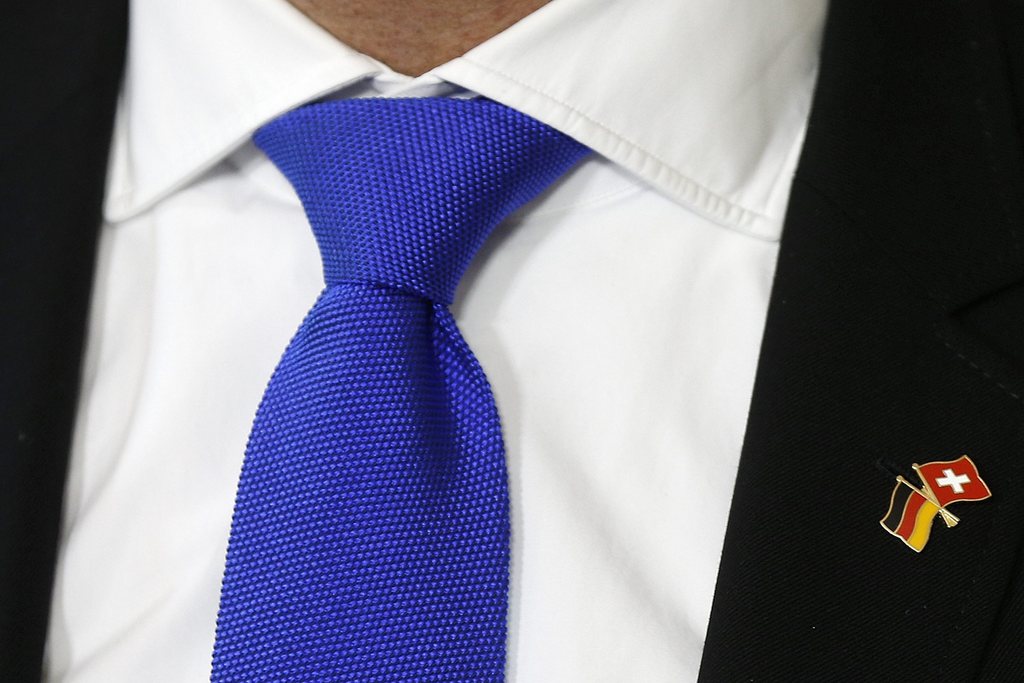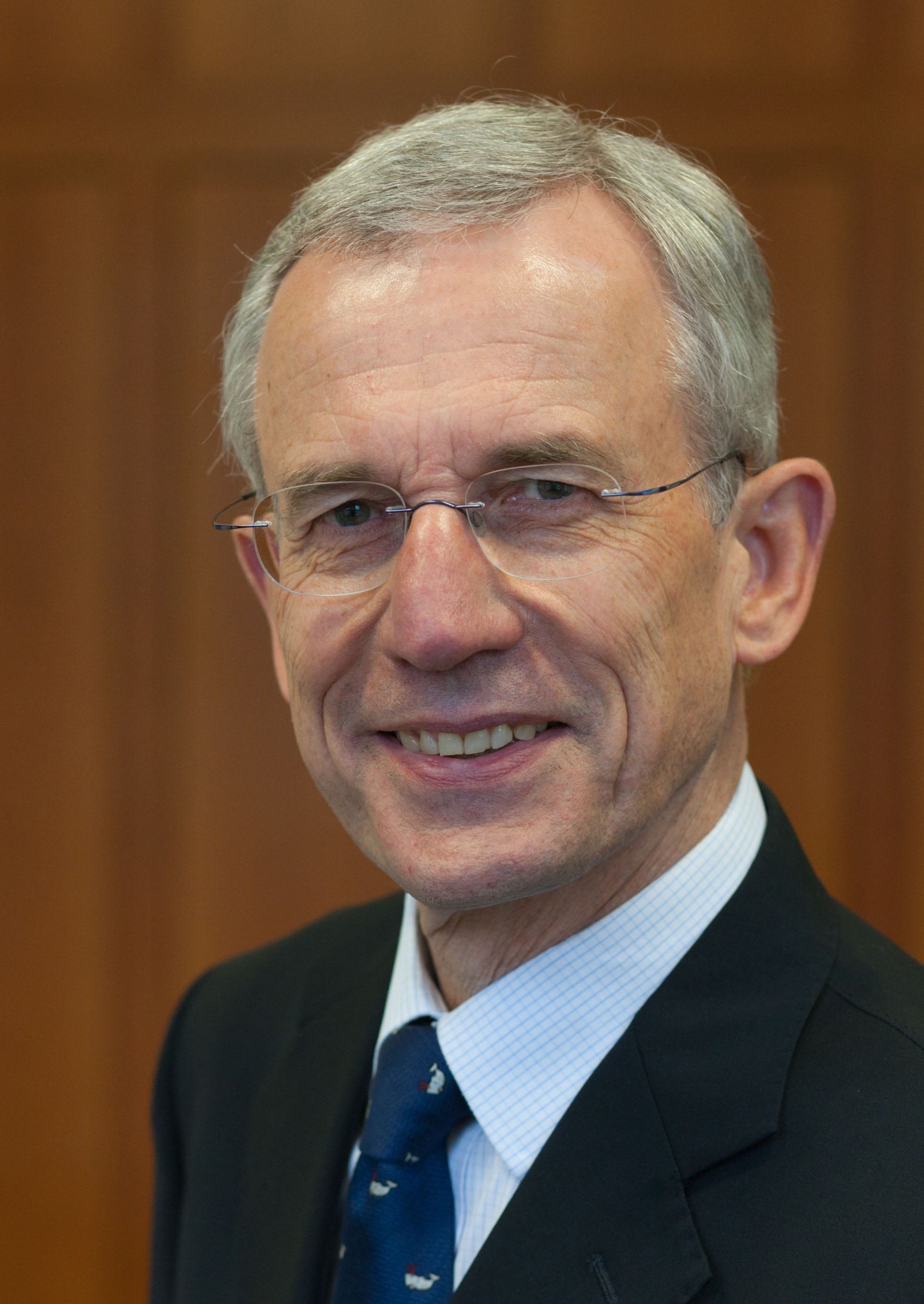
‘Switzerland is a special case in a positive sense’

The outgoing German ambassador in Bern, Peter Gottwald, sees Switzerland as a success model that has benefited from the dynamic European market but says that despite being a unique case, it must make pragmatic adjustments.
During Gottwald’s time in Switzerland, taxes, banking secrecy and German immigrants have been a few of the issues that have clouded the relationship between the Swiss and Germany. The German government also actively pursued tax evaders hiding their money in Swiss banks, leading to clandestine sales of bank data CDs and more trouble for the Swiss financial sector. But Gottwald says those problems are considered far more important than they deserve to be and should be seen in a wider context.
swissinfo.ch: Two years ago, you welcomed the bilateral tax deal between Germany and Switzerland. But it didn’t work out like that: the agreement collapsed at the end of 2012 mainly because it ran into opposition from the German Social Democrats. Were you disappointed?
Peter Gottwald: In many ways, it taught us a lot of lessons. Things that we considered completely normal two years ago look completely different today.
The way this tax agreement was dealt with by politicians in Germany and the fact that it didn’t get through the parliamentary process is one example of that.
At the time, the agreement was a reasonable solution that would have made a lot of things easier. But we must admit that the time for such an agreement has passed, and there is no point in grieving over it.
March 13, 2009: Following pressure from the Organisation for Economic Co-operation and Development (OECD), the Swiss government agrees to adopt OECD standards on administrative assistance in tax matters. By doing so, Switzerland agreed to offer assistance not only in cases on tax fraud, but also in some cases of evasion.
June 2009: Swiss and German finance ministers agree on revisions to the double taxation treaty between the two countries.
September 2011: Swiss Finance Minister Eveline Widmer-Schlumpf and her current German counterpart Wolfgang Schäuble sign a Rubik withholding tax agreement in Berlin.
March 2012: The European Commission warn that the Rubik treaties with both Germany and Britain contained elements that violated EU rules and in particular clashed with an existing withholding tax agreement between the EU and Switzerland.
April 5 2012: Switzerland and Germany revise their deal including a provision to increase tax rates on undeclared legacy assets.
April 17 2012: The EC gives the revised deals with Germany and Britain (which was also altered to meet objections) the green light.
April 2012: The German government approves the revised deal, but the SPD and Green parties say they will fight against its implementation.
June 2012: Following a positive vote in the Swiss Senate, the House of Representatives passes the treaty. However, a rightwing and a leftwing group launch a referendum to bring the deal down, yet fail to collect enough signatures for a nationwide ballot.
November 2012: Germany’s upper house of parliament rejects the accord. The lower house had given it the green light in October.
swissinfo.ch: What should happen next with this tax issue? Do you think there will be new negotiations? Or should the target be the automatic exchange of information?
P.G.: As I said earlier, we are in a new situation. The Swiss banks are actively working toward adjustments, with some success. The question of untaxed German money in Swiss banks could very soon be past history.
The focus now is on fair market access for all banks throughout Europe. I expect that ways will be sought to ensure equal treatment for the EU and Switzerland in the financial arena. There are also new moves underway in the OECD.
Peter Gottwald was born in Frankfurt am Main in 1948.
He studied public administration at the universtiy of Konstanz, on the border with Switzerland.
After further studies in Syracuse, in the United States, he spent several years as director of a UN office in Nigeria.
He joined the German foreign service, working in a number of countries.
Gottwald is an expert in the area of disarmament and arms control.
After 35 years in the diplomatic service, Gottwald retired at the end of August 2013, but will continue to live in Bern for the time being.
His wife is Swiss and they have three daughters.
swissinfo.ch: Are you surprised that banking secrecy imploded as quickly as it did?
P.G.: Only two years ago some people were saying they expected medium-term changes to take five or six years. The fact that things took off so quickly and developed so dynamically did surprise me, although we haven’t reached the end yet. At the moment we’re in a transition phase.
swissinfo.ch: Tax justice and the “elimination of tax havens like Switzerland” have been made into campaign issues for the German Social Democratic Party in the run up to the September elections. Are there really votes to be won in Germany with issues concerning little Switzerland?
P.G.: Tax justice was an issue in the parliamentary elections in the state of North Rhine-Westphalia. Whether it really influenced the results, I don’t know.
In the German parliamentary election campaign Switzerland hasn’t been seized on as a topic in and of itself, but tax justice is indeed an issue – and of course Switzerland comes up in this context.
With voting taking place for the federal parliament on September 22, the hottest phase in the election campaign is yet to come. We can’t yet say for sure what the biggest issues will be, but there are of course European and economic topics like unemployment and worries about the future that will play a much bigger role than tax justice and Switzerland.
swissinfo.ch: During your time in Bern, the international pressure on Switzerland intensified. During his speech on Swiss National Day, President Ueli Maurer talked of a fight between David and Goliath. Do you agree with that assessment?
P.G.: The last two years have shown that Switzerland and Germany have a close working relationship that is maintained by frequent high-level meetings. The two foreign ministers just recently met for the fourth time.
I see that the relationship between Germany and Switzerland is one of mutual respect and benefit. The fact that both sides have sometimes spoken rather sharply is part of normal life and no-one should be too surprised at it.

swissinfo.ch: Some people in Switzerland have expressed their annoyance at the pressure being put on the country. Has this ever been taken out on you?
P.G.: I don’t know whether calling it pressure on Switzerland is the right idea. What is certain is that at the moment Switzerland is critically and closely examining anything that seems out of the ordinary.
On the other hand, Switzerland is justifiably proud of its place at the top of many international rankings for research, for many branches of the economy and for art, for example. You have to see everything in context and not just look at one side of the coin.
swissinfo.ch: Do your fellow Germans feel this perceived pressure on Switzerland?
P.G.: When I came here two years ago, I believed that reaction to the considerable increase in the number of Germans in Switzerland, most of whom are highly qualified workers, would not all be positive. But in talking to Germans in Switzerland as well as with many Swiss, I’ve found that this issue is less significant than I expected.
But, there is a general, undefined feeling having to do with worries about too many foreigners coming to Switzerland, too fast. I think this has to be taken seriously. This trend is the downside of the great success Switzerland has enjoyed thanks to the fact that it has been able to draw on an extensive market of international, but chiefly European, talent, simply because it offers excellent employment conditions.
swissinfo.ch: The great wave of migration from Germany has died down a bit, and now many Germans are in fact leaving Switzerland. Has Switzerland lost some of its appeal?
P.G.: I believe calling it a “wave of migration” is a bit misleading. People today are highly mobile. They go where good conditions are good – today, that might be Switzerland, but tomorrow, it could be somewhere else.
It could also be that Germans are going home because they are finding good opportunities there. We shouldn’t over-interpret this return to Germany.
The number of Germans moving to Switzerland rose sharply from 2007 onwards. There are currently almost 290,000 Germans in the country – the second biggest group of foreigners after Italians.
In addition, at the end of 2012 about 55,000 Germans lived in Germany but crossed the border to work in Switzerland.
In 2012, 3,444 Germans took Swiss nationality, 7% fewer than in the previous year.
Germany is Switzelrand’s biggest trade partner, even though exports to Germany fell by 6% in the first six months of 2013. Imports from Germany also dropped.
(Source: Swiss Foreign Ministry, Federal Customs Administration)
swissinfo.ch: Switzerland lies in the middle of Europe but doesn’t belong to the European Union. Is Switzerland’s system of direct democracy a special case that’s not compatible with the centralised EU?
P.G.: Switzerland is certainly a special case, generally a positive one. But a large part of Switzerland’s success also has to do with the fact that it lies in a dynamic European region where exchanges with neighbouring countries, and indeed the whole world, are flourishing. Seeing Switzerland as a small isolated island is certainly false.
However, with regards to its political institutions, Switzerland is certainly a special case, and direct democracy is a very specific Swiss characteristic that is attracting a lot of interest in Germany at the moment. Workshops and other events are always being held to look at how we could adapt certain elements from Swiss direct democracy to our system.
On the other hand, Switzerland has to realise again and again that despite its uniqueness, it is still part of the European whole, and that means making a host of pragmatic adjustments.
swissinfo.ch: Swiss voters would certainly not vote for Switzerland to join the crisis-ridden EU at the moment…
P.G.: That’s why no-one is claiming that the Swiss ought to be given the chance to vote on EU membership. It’s also true that there has been a whole range of difficult and critical developments in the eurozone in the past few years. But the EU has always come through crises before. And the latest crises have led to the development of new rules designed not to make the EU more centralised, but more resistant to crises in the future.
swissinfo.ch: After two years as the German ambassador to Switzerland, you are now retiring. Has your view of Switzerland changed during your time here?
P.G.: Definitely. It was my great good fortune that the parliamentary elections took place during the beginning of my time here. That gave me a crash-course in Swiss domestic politics and the experience of seeing how the cabinet members were re-elected. These past two years have been an important learning experience for me. I have a less simplistic and much more realistic picture of Switzerland than I could have had before.
(Translated from German by Veronica DeVore)

In compliance with the JTI standards
More: SWI swissinfo.ch certified by the Journalism Trust Initiative
















![The four-metre-long painting "Sonntag der Bergbauern" [Sunday of the Mountain Farmers, 1923-24/26] had to be removed by a crane from the German Chancellery in Berlin for the exhibition in Bern.](https://www.swissinfo.ch/content/wp-content/uploads/sites/13/2025/12/01_Pressebild_KirchnerxKirchner.jpg?ver=cb688ed5)














You can find an overview of ongoing debates with our journalists here . Please join us!
If you want to start a conversation about a topic raised in this article or want to report factual errors, email us at english@swissinfo.ch.